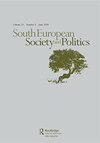西班牙的选举竞争与党派情感两极分化
IF 4.6
1区 社会学
Q1 POLITICAL SCIENCE
引用次数: 6
摘要
先前的研究已经报道了政治竞争会增加党派情感两极分化。我们使用西班牙情感两极分化调查的四波和重复测量设计来检验这一假设。其中两波是在两次竞选期间进行的。这使我们能够研究群体内和群体外的情绪是否受到选举接近度的影响。对群体内和群体外成员的情绪差异随着选举而增加。然而,这主要是由对内部群体的积极情绪的增加所驱动的。选举也会增加对群体外成员的负面影响,但程度较轻。在西班牙,这些选举几乎没有影响到地域的情感两极分化。本文章由计算机程序翻译,如有差异,请以英文原文为准。
Electoral Competition and Partisan Affective Polarisation in Spain
ABSTRACT Previous studies have reported that political competition increases partisan affective polarisation. We test this hypothesis using the four waves of a survey on affective polarisation in Spain and a repeated measures design. Two of these waves were conducted during two electoral campaigns. This allows us to study whether in-group and out-group sentiments are affected by election proximity. Differences in sentiments towards in-group and out-group members increase with elections. However, this is mostly driven by an increase in positive sentiments towards the in-group. Elections also increase negative affects towards out-group members, but to a lesser extent. In Spain, these elections hardly affected territorial affective polarisation.
求助全文
通过发布文献求助,成功后即可免费获取论文全文。
去求助
来源期刊

South European Society and Politics
Multiple-
CiteScore
5.80
自引率
21.20%
发文量
14
期刊介绍:
A leading point of reference for scholars of Southern Europe, South European Society and Politics promotes both comparative and inter-disciplinary analyses, as well as offering innovative single county and sub-national studies. The journal acts as a forum for social, economic, cultural, contemporary historical and political approaches to research on the region, and is particularly keen to sponsor policy–focused studies in all these disciplines. The journal publishes research articles; South European Atlas with election reports and articles on other subjects of topical interest, and an extensive book reviews section, including both review articles and individual book reviews.
 求助内容:
求助内容: 应助结果提醒方式:
应助结果提醒方式:


